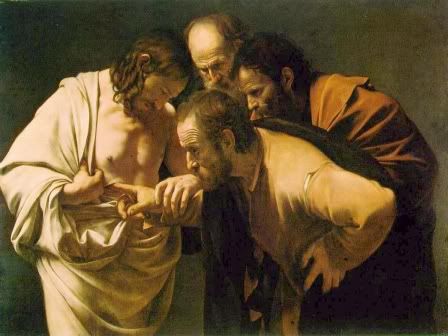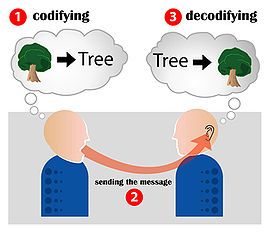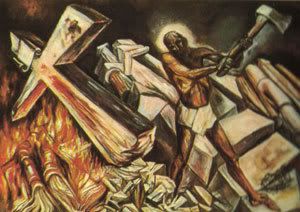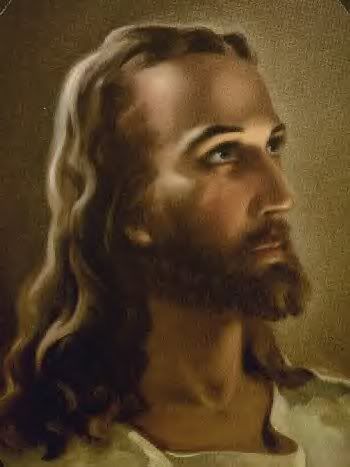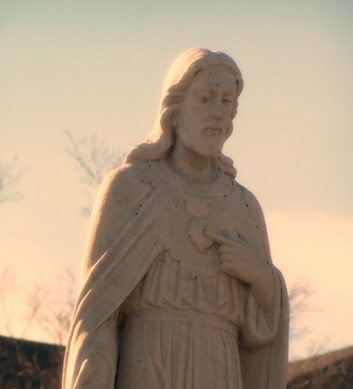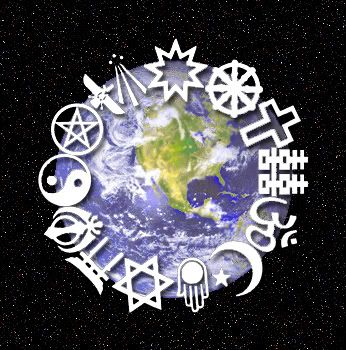
I have been assuming that experience of God is at a subliminal level. Since we all experience it that way we can experience it and not even know. Thus to talk about the inklings of ideas of God that we get and about any actual known experiences we have, we must filter that through cultural constructs. The reason is obvious, becuase culture is langue and it's through the constructs of culture that we interpret the world. God is beyond our understanding. Even those who experience God directly and so powerfully that they know it is real, are still confronted with a phenomenon of which they cannot speak directly. To make sense of it and to communicate it to others we must filter it through constructs. That means that our understanding of God is largely metaphor.
Given this framework I've come to a slow conclusion over the last couple of decades that the same reality stands behind all faiths. That doesn't mean that I see Krishna or Bhudda as Jesus, but it does mean that I see God as the motivating instigator of religion as a whole and of belief in God in particular. I see God as working in all cultures. I see God as having interaction with all faiths, but not filling the blanks as other gods. I see a basis for this in the Bible.
Paul said "To those who through persistance seek glory, honor and immortality he will give eternal life.But for those who are self-seeking and who reject the good and follow evil there will be wrath and anger...first for the Jew and then for the gentile; but glory honor and peace for everyone who does good. For God does not show favoritism. All who sin apart from the law will perish apart form the law and all who sin under the law will be judged by the law. For it is not those who hear the law who are righteous in God's sight, it is those who obey the law who will be declared righteous.
Indeed when Gentiles who do not have the law, do by nature things required by the law, they are a law for themselves even though they do not have the law, since they show that the requirement of the law are written on their hearts, their consciences bearing witness and their hearts now accusing, now even defending them..." (Romans 2:7-15).[1] New American Standard and other translations say "their hearts accusing, now excusing them..." Most Christians are afraid of this conclusion and they down play this verse. Often Evangelicals will come back and say "he makes it clear in the next passage that no one can really follow the law on their hearts." Well, if they can't, than they can't. But if they can, and do, than God will excuse them. God knows the heart, we do not. The verse clearly opens the door to the possibility of salvation (although by Jesus) thorugh a de facto arrangement in which one is seeking the good without knowing the object one is seeking (Jesus). In other words, it is possible that people in other cultures who follow the moral law written on the heart know Jesus de facto even if they don't know him overtly. Paul backs up this conclusion in Acts 17:22-30 [2] Paul goes to Athens as is asked by the Athenian philosophers to explain his ideas to them.
These were pagan followers of another religion. Paul stood up and said to them, "Men of Athens, I see that in every way you are very religious for as I walked around and observed your objects of worship I even found an alter with this inscription 'TO AN UNKOWN GOD' Now what you worship as something unknown I am going to proclaim to you."He basically says that they are worshiping God, they just don't know who he is. That's why he says "I will make it known to you." He doesn't say "you have the wrong idea completely." Most Evangelicals dismiss this as a neat rhetorical trick. But if we assume that Paul would not lie or distort his beliefs for the sake of cheap tricks, we must consider that he did not say "you are all a bunch of pagans and you are going to hell!" He essentially told them, "God is working in your culture, you do know God, but you don't know who God is. You seek him, without knowing the one you seek. He goes on,(v27)"God did this [created humanity and scattered them into different cultures] so that men would seek him and perhaps reach out and find him though he is not far form each one of us." This implies that God not only wants to work in other cultures, but that it is actually his paln to do things in this way. Perhaps through a diversity of insights we might come to know God better. Perhaps it means that through spreading the Gospel people would come to contemplate better the meaning of God's love.
In any case, it does mean that God is working in other cultures, and that God is in the hearts of all people drawing them to himself. Of their worship of idols, Paul said "in past times God overlooked such ignorance but now he commands all people everywhere to repent" (v30). Now what can this mean? God never overlooks idolatry or paganism, in the OT he's always commanding the Israelite to wipe them out and expressly forbidding idolatry. It means that on an individual basis when God judges the hearts of people, he looks at their desire to seek him, to seek the good. That their status as individuals in a pagan culture does not negate the good they have done, and their ignorance of idolotry does not discount their desire to seek the good or the truth. IT means that they are following Jesus if they live in the moral life, even though they follow him as something unknown to them. IT also means that all of us should come into the truth, we should seek to know God fully, and when we do that we find that it is Jesus all along.
One thing this might change is our understanding of the chruch. It was the theologian Cyprian (200-258) who said there is no salvation outside the chruch. This doctrine is called extra ecclesiam. He was born in Carthage around 200. He was made Bishop of Carthage in 248, died in 258. [3] In his most important work, "De unitate ecclesiae." he states: "He can no longer have God for his Father who has not the Church for his mother; . . . he who gathereth elsewhere than in the Church scatters the Church of Christ" (vi.); "nor is there any other home to believers but the one Church" (ix.).[4] Cyprian should not come across as a bad guy even though he makes this exclusivity statement. For one thing he favored reinstating (after suitable intervals of probation and penance) those who fell away under persecution recognizing the extreme hardship they were under. He also faced sickness in order to stay in the city and care for plague victims. He was falsely accused and put to death by the very chruch which he so ardently defended.[5]
This is in the third century. Christianity had been going for a long time before this formal declaration that there is no salvation outside the chruch. Of course this doesn't mean they had not been saying it here and there all along. Yet they were pretty far removed from the understanding of Paul who way back there in the late 50s of the first century was telling the Greeks they already knew God but needed to know more about him. Not only had a lot happened, Christianity became a religion prosecuted religion of martyrdom, but also thoroughly gentile so that the perspective of Judaism was forgotten. Jews reject idols but they did not see pagans as damned merely for being who they were. Modern Jews still largely hold to that preservative.
One problem with extra ecclesiam is I'm a protestant! That began as a Catholic doctrine, when the split came with the east the Roman Catholics continued the idea, it's a Roman catholic notions. Though many protestants passionately accept the Father's as gospel the teachings of the Apostolic fathers became the teachings of the Catholics and are acted upon as though they exclude protestants. At least before Vatican II. While I am passionately defending extra ecclesiam a bunch of Catholics are looking at me and saying "but you are outside the chruch yourself!" So I have to re think this busienss of the nature of the chruch. First of all I have have to see the chruch as the tool, not the point of the mission. It is Christ's mission not the church's mission. As Motlmann says "The Mission has a chruch."[6] I also no longer see the church as the agent of salvation. Membership in the chruch is not what saves us. It maybe valid, it may be necessary but it's not the saving agent. Christ's atoning sacrifice is what creates the ground upon which forgiveness is possible. The chruch just preaches the message.
We find in the OT there were priests and prophets of God who were not connected with Israel, thus they were outside what was the chruch of that time. Balaam of Balaam's Donkey,(numbers 22:21-29) was called a prophet and was told to prophesy against the Israelites.
Numbers 22:
And Balak the son of Zippor was king of the Moabites at that time. 5 Then he sent messengers to Balaam the son of Beor at Pethor, which is near the River[a] in the land of the sons of his people,[b] to call him, saying: “Look, a people has come from Egypt. See, they cover the face of the earth, and are settling next to me! 6 Therefore please come at once, curse this people for me, for they are too mighty for me. Perhaps I shall be able to defeat them and drive them out of the land, for I know that he whom you bless is blessed, and he whom you curse is cursed.”When he sees the angel and gets it right that he's suppossed to say waht God tells him he says: 38 “Well, I have come to you now,” Balaam replied. “But I can’t say whatever I please. I must speak only what God puts in my mouth.” He doesn't say say "what God is this? what angle is this." He is already known as a spiritual person who could curse Israel, he already knows God and knows about God's angels. So there is evidence of spiritually and following of God outside the "chruch" of that day. We have a similar phenomenon with Melchizedek. He is called a priest of God most high, before Israel exists. In 14 Genesis He is introduced as King of Salem, and in Hebrews he is he is said to be a type of Christ and placed into Israel as bearer of an order of Priesthood through which Jesus' own high priesthood is reconned. (Heberws 7).
I normally value the fathers and use them as precedents but I have to take Paul's preservative over that of the Church fathers, especially such a late father as third century. I can't accept a rigid exclusive view that would condemn other traditions and culture just for being who they are. It would be totally unjust if God condemned people just becuase they take their own culture seriously. We have to take our own culture seriously, what else do we have? Why should be accept a foreign culture merely becasue they say "we are the right way?" How can we expect them to be any different.
Yet there are considerations that have come to concern me.
The three major considerations:
(1) Passages about idolatry
numerous others.Exodus 20:3-6 ESV / 290 helpful votes
“You shall have no other gods before me. “You shall not make for yourself a carved image, or any likeness of anything that is in heaven above, or that is in the earth beneath, or that is in the water under the earth. You shall not bow down to them or serve them, for I the Lord your God am a jealous God, visiting the iniquity of the fathers on the children to the third and the fourth generation of those who hate me, but showing steadfast love to thousands of those who love me and keep my commandments.
1 John 5:21 ESV / 145 helpful votes
Little children, keep yourselves from idols.Jonah 2:8 ESV / 135 helpful votes
Those who pay regard to vain idols forsake their hope of steadfast love.Colossians 3:5 ESV / 130 helpful votes
Put to death therefore what is earthly in you: sexual immorality, impurity, passion, evil desire, and covetousness, which is idolatry.Psalm 16:4 ESV / 83 helpful votes
The sorrows of those who run after another god shall multiply; their drink offerings of blood I will not pour out or take their names on my lips.
(2) Warning not to preach any other Gospel
Galations 1:
8 But even if we or an angel from heaven should preach a gospel other than the one we preached to you, let them be under God’s curse! 9 As we have already said, so now I say again: If anybody is preaching to you a gospel other than what you accepted, let them be under God’s curse!
(3) false prophets lead one away to other gods.
Deuteronomy 18:20 ESV / 48 helpful votes
But the prophet who presumes to speak a word in my name that I have not commanded him to speak, or who speaks in the name of other gods, that same prophet shall die.’
It might bear reiterating: I am not saying that other gods are actually god.I may have expressed myself badly at times on message boards, but that's no excuse. We must continue to be clear. I say "all gods point to God." Point to does not mean they are God. Krishna is not Jesus. I am not saying Brahmin is the creator God of the universes. I am saying that all people have an innate sense of the true creator God and they are seeking God and they have a concept of God, however flawed or inaccurate all our concepts are. The direction in which they point is toward the true God but that does not mean that the specific personage of which they conceive is actually the true thing. I don't worship otehr gods nor do I encourage other to do so. I do appreciate and admire other faiths, and I study other faiths. I only study them with an understanding that aspects of their view might point in the right direction but for me Jesus is it. I'm not studying other faiths becuase I'm shopping for a new faith. Nor do I read them to put them down or to compare them unfavorably to my own. It just has to do with being a scholar.
I find value in the perspectives without worshiping other gods or abandoning my own faith. There is some comparison bewteen the talk of sowing and reaping in the OT, view of Karma in Hinduism and talk to balance and the Tao in Taoism. I'm not accessing that to obtain salvation through good Karma or through the Tao.
The question about the Gospel, what constitutes "another Gospel" I find is the most crucial question. That statement goes with the theology in the book of Galatians. It's a theology contains a social aspect and it counters racism, sexism, and preaches equality and social action.[7] He gives a short summary of the Gospel just before the statement about another Gospel so there's no doubt what he's calling the Gospel: Grace and peace to you from God our Father and the Lord Jesus Christ, 4 who gave himself for our sins to rescue us from the present evil age, according to the will of our God and Father, 5 to whom be glory for ever and ever. Amen. This corresponds to Peter's understanding in Acts: "for there is no other name under heaven given among men by which we must be saved" (Acts 4:12). I don't say there is any other name. If I one who follows the true nature of the good, the creator God and seeks the right, is defacto follow Jesus even though he may not know it's Jesus he's following, that is not the same as saying that he's saved by another name. It's saying he saved in spite of antoehr name.
The Gospel I responded to and was born again by was more a presence than a theology. I was responding to a real presence that I actually felt and a prayer that was answered immediately, a miracle before my very eyes.[8] I understood little theology but what I did understand was that Jesus would change my life from inside, by reigniting some aspect of my spiritual being, through his love, or the sake of his love and not in exchange for anything I could do or as a reward for anything I achieved. I knew it had something to do with Jesus death on the cross and his resurrection. I could not have explained it then as I can now.
I genuinely respect other faiths because they are indicative of who people are. Faiths are different because they are filtered through culture, and culture is what makes us who we are, either directly or indirectly. Even in rebellion against our culture we are being shaped by it. All faiths point to the one reality behind them all but this s not a licensee to worship "other gods." Once we know Jesus we know God. That doesn't mean that people of other faiths are seeking turth, that they aren't imbued with truth, that they don't follow Jesus without realizing that's who he is.
Sources
[1](Romans 2:7-15).
[2] Acts 17:22-30
[3]"Cyprian," Wikipedia, http://en.wikipedia.org/wiki/Cyprian
accessed 5/13/14.
[4] Ibid.
[5] James E. Keifer, "Cyprian of Carthage, Bishop and Martyr." Bibliographical sketches of Memorable Christians of the Past. Online source: http://justus.anglican.org/resources/bio/242.html
accessed 5/13/14.
[6] I hope the reader will forgive me but I don't know where that quotation is found. I think it might be in Jurgen Motlmann's The Crucified God. I remember it from class notes in seminary (Perkins: SMU).
[7] Metacrock, "Women and Christity: Netiehr male nor female." Doxa: Christian Thought i the 21st century. On line resource. http://www.doxa.ws/social/Women/equal2.html
accessed 5/13/14
[8] see page 2 of my testimony: http://www.doxa.ws/Theology/Testamony.html chriatianity other faiths

